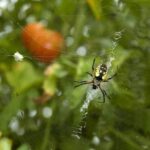Are you struggling to keep deer and rabbits from devouring your vegetable garden? Finding the best deer and rabbit repellent for vegetable gardens is essential in protecting your hard-earned produce. These pests can wreak havoc on your plants, leaving you with nothing to show for your efforts. In this article, we’ll explore the threat that deer and rabbits pose to vegetable gardens, as well as the most effective ways to repel them.
Deer and rabbits are known for their voracious appetites when it comes to feasting on garden vegetation, including vegetables. From tender young shoots to ripe fruits, these animals can cause significant damage in a short amount of time. As gardeners, it’s important to be aware of the potential devastation they can cause and take proactive measures to protect our crops.
In our quest to safeguard our vegetable gardens from deer and rabbits, we have various methods at our disposal. From traditional deterrents to homemade remedies, there are many options available. Additionally, the choice between chemical and natural repellents is a crucial decision that will impact both your garden’s health and the effectiveness of the repellent. Let’s delve into these topics further in the upcoming sections of this article.
Common Repellent Methods
Deer and rabbits can pose a significant threat to vegetable gardens, as they are known for feeding on tender plants and causing extensive damage. Many gardeners turn to repellents to keep these pests at bay and protect their crops. There are several common methods for deer and rabbit control, including traditional and home remedies that have been used for generations.
Traditional repellent methods often involve using strong-smelling substances or physical barriers to deter deer and rabbits from entering the garden. Some popular options include hanging bars of deodorant soap around the garden, spreading human hair or blood meal, or installing motion-activated sprinklers to startle animals. These methods are popular for their simplicity and affordability, making them accessible for many gardeners.
Home remedies for deer and rabbit control also abound, with natural ingredients like garlic, pepper spray, vinegar, or egg-based solutions being touted as effective repellents. Many gardeners appreciate these DIY options for their eco-friendly nature and low impact on the environment. However, while these methods may work in some cases, they can be less reliable and may require more frequent reapplication compared to commercial products.
When considering which method to use as your best bet deer and rabbit repellent for vegetable gardens it is important to consider both the effectiveness of each option but also your individual preferences concerning cost-effectiveness or environmental impact. Here is a list with a few common repellent methods:
- Hanging bars of deodorant soap
- Spreading human hair or blood meal
- Installing motion-activated sprinklers
- Using garlic or pepper spray
- Spraying vinegar solution
- Applying egg-based solutions
Ultimately, finding the best deer and rabbit repellent for your vegetable garden requires careful consideration of various factors such as effectiveness, convenience, cost, and environmental impact. By evaluating different traditional methods along with homemade remedies, you can make an informed decision on how best to protect your vegetable garden from these pesky pests.
Chemical vs Natural Repellents
When it comes to protecting your vegetable garden from deer and rabbits, there are two main categories of repellents to consider: chemical and natural. Each type has its own pros and cons, so it’s important to weigh your options before deciding on the best deer and rabbit repellent for your specific needs.
Chemical repellents often contain ingredients that deter deer and rabbits through either taste or scent aversion. These products can provide effective protection for your vegetable garden, but they also come with some drawbacks. One major concern is the potential harm these chemicals can cause to the environment, other wildlife, or even your garden plants if not used properly.
On the other hand, natural repellents offer a safer alternative for both your garden and the surrounding ecosystem. Many natural repellents use ingredients like garlic, pepper, or predator urine to deter deer and rabbits without posing a threat to beneficial insects or animals. However, natural repellents may need to be reapplied more frequently than their chemical counterparts and can be less effective in certain situations.
Ultimately, the decision between chemical and natural repellents will depend on your own preferences as well as any environmental considerations. It’s always wise to do thorough research on any product you’re considering using in your garden to ensure it aligns with your values and gardening goals.
| Repellent Type | Pros | Cons |
|---|---|---|
| Chemical | Effective protection | Potential harm to environment and plants if not used correctly |
| Natural | Safer for environment | Potential need for more frequent reapplication |
Best Deer Repellents for Vegetable Gardens
When it comes to protecting your vegetable garden from the threat of deer, there are a variety of repellent products on the market that claim to keep these animals at bay. However, not all deer repellents are created equal, and it’s important to choose a product that is both effective and safe for your crops. Here are some top-rated deer repellents that have been proven to be effective in vegetable gardens:
Liquid Fence Deer & Rabbit Repellent
Liquid Fence Deer & Rabbit Repellent is a highly-rated product that uses natural ingredients to deter deer and rabbits from feeding on plants. The formula is rain-resistant and can provide protection for up to 3 months, making it a convenient option for gardeners. Many users have reported significant reduction in deer damage after using this product in their vegetable gardens.
Bobbex Deer Repellent
Bobbex Deer Repellent is another popular choice among gardeners for its effectiveness in repelling deer. This product is made from natural ingredients and works by emitting an odor that is unpleasant to deer, keeping them away from vulnerable plants. It is safe to use on edible crops and has received positive feedback for its ability to protect vegetable gardens from deer damage.
Plantskydd Deer Repellent
Plantskydd Deer Repellent is a long-lasting solution that is especially useful for protecting young seedlings and newly planted vegetables from deer browsing. This product is unique in that it contains dried blood as its active ingredient, which effectively deters deer without posing harm to plants or the environment. Many gardeners rely on Plantskydd Deer Repellent as a key component of their deer control strategy.
Best Rabbit Repellents for Vegetable Gardens
When it comes to protecting your vegetable garden from the pesky munching of rabbits, having the best rabbit repellent is essential. Here are some highly-rated solutions for rabbit control that you can consider using in your vegetable garden:
- Liquid Fence Deer & Rabbit Repellent: This repellent is made from natural ingredients and is safe to use on vegetables, fruits, and ornamentals. It works by emitting a scent that rabbits find offensive, deterring them from entering your garden area.
- Havahart Critter Ridder: This granular repellent not only targets rabbits but also repels other animals such as deer, raccoons, and squirrels. It uses a blend of natural ingredients that create an unpleasant taste and smell for rabbits, discouraging them from feeding on your plants.
- Plantskydd Animal Repellent: This environmentally-friendly repellent is formulated to target rabbits as well as other browsing animals like deer. It contains a mix of blood meal and bone meal that gives off an odor not appealing to rabbits, effectively keeping them away from your vegetable garden.
These highly-rated rabbit repellents are designed to provide long-lasting protection for your vegetable garden without causing harm to the animals or your plants. By incorporating these solutions into your garden maintenance routine, you can effectively keep rabbits at bay and enjoy the fruits of your labor without worrying about their destruction.
In addition to using the best rabbit repellents on the market, it’s important to follow proper application and maintenance techniques to maximize their effectiveness in protecting your vegetable garden from rabbit damage. Be sure to read and follow the instructions provided by the manufacturer for each repellent product you choose to use. With the right approach and products in place, you can create a rabbit-resistant environment for your beloved vegetable plants.
How to Use Repellents Effectively
Using the best deer and rabbit repellent for vegetable gardens is essential to protect your crops from these hungry pests. However, simply applying the repellent is not enough; it must be used effectively to ensure maximum results. Here are some tips for proper application and maintenance of repellents in your vegetable garden.
First, it’s important to carefully read and follow the instructions on the repellent product you choose. Whether it’s a spray, granules, or electronic deterrent, understanding how to properly apply the product will increase its effectiveness. Additionally, wearing gloves and protective clothing during application can prevent skin irritation from chemical-based repellents.
Regular maintenance of the repellent is also crucial for long-term success. This may include reapplying after heavy rain or watering, as well as replacing any electronic devices or batteries as needed. Keeping an eye on the condition of your chosen repellent will ensure that your vegetable garden remains protected from deer and rabbits throughout the growing season.
In addition to proper application and maintenance of repellents, consider using a combination of tactics for the best results. Companion planting with strong-smelling herbs or flowers can help mask the scent of your vegetables, while physical barriers such as fencing or scare tactics like motion-activated sprinklers can further deter deer and rabbits from entering your garden.
| Tips for Using Repellents | Proper Application and Maintenance |
|---|---|
| Read and follow product instructions | Understanding how to apply the chosen repellent |
| Wear protective clothing during application | Preventing skin irritation from chemical-based repellents |
| Regular maintenance after rain or watering | Reapplying to ensure continued protection |
Other Preventive Measures
Fencing
One of the most effective ways to keep deer and rabbits out of your vegetable garden is by installing a fence. A well-constructed fence can serve as a physical barrier that prevents these animals from accessing your crops. When it comes to deer, a fence should be at least 8 feet tall to deter them from jumping over.
For rabbits, a 2-foot high fence made of wire mesh buried at least 6 inches in the ground can help keep them out. Additionally, adding an angled “apron” along the bottom of the fence can further discourage rabbits from burrowing underneath.
Scare Tactics
Scare tactics can also be used to deter deer and rabbits from entering your garden. This can include using noise-making devices such as wind chimes or motion-activated sprinklers that startle these animals when they approach. Some gardeners have found success with hanging reflective items like tin foil strips or CDs around the perimeter of their garden to create flashes of light that can scare off animals.
Companion Planting
Incorporating companion planting techniques can help repel deer and rabbits by using certain plants that are unappealing to these animals. For example, strong-smelling herbs like mint, oregano, and thyme can act as natural repellents for both deer and rabbits. Additionally, planting pungent flowers such as marigolds or daffodils around the perimeter of your garden can help keep these pests at bay.
By implementing these preventive measures in addition to using the best deer and rabbit repellent for vegetable gardens, you can effectively protect your crops from potential damage caused by these wildlife intruders.
Final Thoughts
In conclusion, when it comes to protecting your vegetable garden from the potential threat of deer and rabbits, choosing the best repellent is crucial. It’s important to understand the different types of repellents available, including chemical and natural options, as well as traditional and home remedy methods. Each has its own pros and cons, so it’s essential to consider your specific gardening needs and preferences.
After reviewing the top products for deer and rabbit repellents, it’s clear that there are highly-rated solutions available for both types of pests. It’s important to consider factors such as effectiveness, ease of use, and environmental impact when making your selection. Whether you opt for a commercial spray or a homemade solution, the key is to find a repellent that works best for your vegetable garden.
While repellents can be effective in deterring deer and rabbits, it’s also helpful to consider other preventive measures. Fencing, scare tactics, and companion planting can all play a role in keeping these pests at bay. By combining these strategies with the best deer and rabbit repellent for your specific vegetable garden needs, you can create a comprehensive plan for protecting your crops from harm.

If you’re looking to get into vegetable gardening, or are just looking for some tips on how to make your current garden better, then you’ve come to the right place! My name is Ethel and I have been gardening for years. In this blog, I’m going to share with you some of my best tips on how to create a successful vegetable garden.





